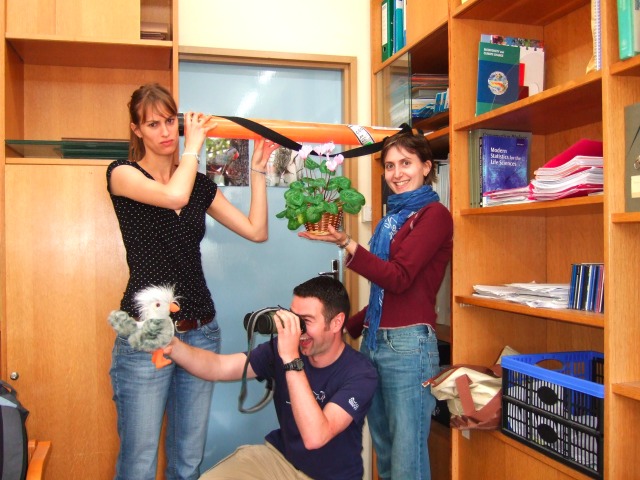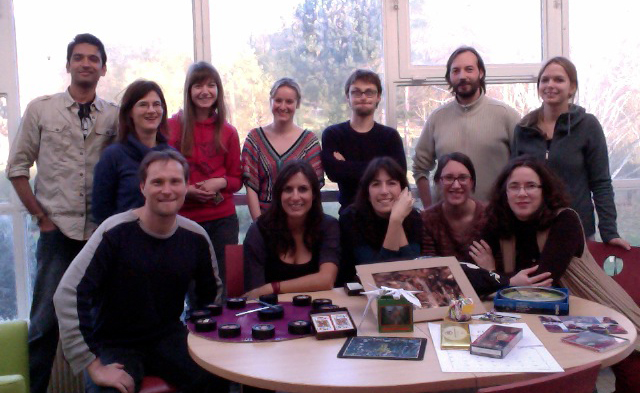FONCTIONNEMENT
our objectives
The objectives of our research group are:
- to produce high quality science (reflected in publications and theses);
- to provide high quality training for graduates and give them the best to be competitive in getting a job in academia, and;
- to promote conservation of biodiversity through providing and communicating information and expertise, to colleagues and the wider public.
My objective and yours are exactly the same: make you the best scientist possible, with the best publication list possible.
our philosophy
Without knowing it, it seems that I generally try to follow the management philosophy of W. Edwards Deming, which focuses on:
- constant improvement of quality,
- management by leadership, not intimidation or blame,
- cooperation, not competition,
- training through involvement outside as well as inside the classroom, and
- promotion of pride of workmanship.
I’m not so sure of what the last two points involve, but they sound good.
what I expect from you

GOALS
The goal of a Master’s degree is to learn to do research, and, importantly, to insure that you were born to do research and ready to devote your life and your very soul to Science… The Master project in France is really short (6-9 months) and it is unreasonable to expect a publication from it. Yet, some achieve this (and even more) and I am getting used to excellent students, so it would be a good idea to at least aim for a completed work of publishable quality at the time the report is to be written. But keep in mind that the main goals are to prepare yourself to do a PhD thesis and this implies:
- getting a good idea of what it will be
- getting a fellowship for it (i.e., producing a competitive Master Thesis).
The goal of a Ph.D. degree is to produce an original piece of research, a personal claim over a concept, a state or a process and in doing so to learn how to do exceptional research. Your goal is to produce a dissertation of original work and exceptional (and international) quality within 3 years. As a by-product, your goal is to communicate your results through quality publications in international refereed journals. You will need at least a couple of good publications to defend your thesis.
The goal of a postdoc is to gain additional skills and areas of expertise and to further your professional network by working in a different scientific environment from the PhD Thesis. There is no contract tying a postdoc to publishing research articles, but it comes to sense that it is expected from you by the people who finance your salary and grants, by the lab and by me. Besides, everybody will see a postdoctoral project without publication as a failure.
TRAINING
A major aspect of your training here will be in your interactions with fellow students and researchers in this lab and others, and colleagues at professional meetings. Those of you on “monitorat” will also gain great experience in teaching. I usually try to involve postdocs in teaching when I can, even if for very short commitments. Finally, you will gain experience in helping others in the group.
Academia is a very competitive world. Yet, you are not in competition with other members of the group, and even outside the lab, I’ve always found it more rewarding to collaborate. Remember that cooperation is at least as efficient an ecological strength as competition. And it is more fun. When anybody from this group or this lab gets recognition through a publication, grant, award, job, or the like, it reflects well on all of us. And science advances.
This philosophy also transcends to the lab and university level. I tend to favour formal collaboration between group members, global brainstorming sessions and Journal Clubs and I like it when everyone in the group is reasonably familiar with everyone else’s project and ready to give a hand when needed. Every one has a different set of skills and can provide the others with some help, being in statistics, computer handling, English, modelling, manuscript preparation, figure drawing, administrative hurdles and everyday life logistics. This group works well because people help.
TIME
We do not require any set hours or amount of time spent doing your research. This is not a factory, and we don’t have a time clock. Mostly, your main tool is your brain, and it is difficult to have it make scheduled shifts. What is important is:
- that you are efficient and
- that you are present in the lab.
I have found that email/skype/mns is a good tool for keeping the communication constant and replying quickly to simple questions that can block you, but as a general rule, I prefer that student work at home only exceptionally. Internet communication is rather for when I am not present, not you. As detailed above, interactions are important, and Murphy’s law makes it that I always need to reach you urgently when you are not present and didn’t tell me so. Although no supervisor counts hours, we all generally expect our students to realise asap that they don’t work for us but for themselves.
The work is goal-oriented and you should always aim for the best quality work. To achieve this, I have found that the one key component is to enjoy what we’re doing. That means enjoying doing research, liking being in the lab and mostly owning the subject (your thesis is your ‘baby’, work with me to make it tailored to you). This creativity will have some constraints though, some of which will come from the restriction of areas I can and want to work on, the feasibility of the project (given the timeframe) and the relevance of the topic in the international context.
As stated above, the research project you work on will be the cornerstone of your time here. Professionally, you will be identified for some time to come by the project you work on and the publication(s) that come from it. You should aim to work on a project that is not just interesting but exciting. I’d like you to get out of bed in the morning yearning to be in the lab to finish what you reluctantly stop the day before. I don’t want you to be an overworked slave, I want you to love what you do. Motivation is good, but good research is rather fuelled by passion.

what you can expect from me
Master students are generally entitled to a small monthly allowance (about 400 euros), which is supposed to help them concentrate on doing their studies rather than asking people whether they want fries with their burger. An ecology PhD thesis in France cannot be started without a secure funding of three years, so one of the first steps when you want to apply for a PhD thesis is considering how to get a fellowship. You can expect from me to help you in this regard. I will also do my best to help postdocs find funding, but obviously those who show they can raise their fellowship on their own will be advantaged, as I don’t always have fellowships with my grants.
You can also expect me to try and provide the best scientific environment for you, starting with the material aspect (computers, software, books, office and desk-related stuff) and of course including scientific help, strategy advices and concrete help to produce the best manuscripts and submit it to the most relevant journals. You will also have my attentive ear and moral support if you seek them.
As you develop and conduct your research, you will gain experience and confidence in becoming an expert on your particular topic. You can expect to have opportunities to attend scientific meetings, present your research results there, and interact with other experts and potential employers/colleagues. I view these congresses as excellent opportunities to meet new colleagues, get major feedback, develop a different set of communicating skills and represent the lab. So when the results are worth it, I try to offer the possibility of going to international congresses to postdocs and master students alike.
One of the yardsticks I use to judge the success of my program is the success of my students in getting jobs or further educational opportunities. You can expect me to provide any and all contacts and information sources I have to help you in this regard. You can also count on a strongly favourable but honest reference to potential employers/mentors.

